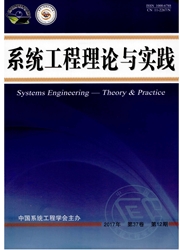

 中文摘要:
中文摘要:
针对时间序列包含噪声以及单一模型可能存在预测表现不稳定的问题,本文提出了一个基于奇异谱分析(SSA)的集成预测模型,并将其运用于我国年度航空客运量的预测中.首先,采用SSA方法对原始时间序列进行分解和重构,得到一个剔除噪声的时间序列,然后将其作为单整自回归移动平均模型(ARIMA)、支持向量回归模型(SVR)、Holt—Winters方法(HW)等单一模型的输入并进行预测,接着再采用加权平均集成预测方法(WA)将三种单一模型的预测结果进行综合集成.通过与各单一模型、基于经验模态分解方法(EMD)的模型以及简单平均集成预测方法fsA)的预测结果进行对比发现,本文所建模型具有较高的预测精度和较稳定的预测表现.最后,采用本文的模型对我国20142016年年度航空客运量进行了预测.
 英文摘要:
英文摘要:
Considering the noise contained in tittle-series data and the sometimes poor forecasting performance of single model, this paper proposes an integrated model based on singular spectrum analysis (SSA) for Chinese annual air passenger traffic forecasting. In the modeling process, the original time series was first decomposed into several different components using SSA, and the main components were extracted to reconstruct a new time series with the noise removed. Then, the reconstructed time series was predicted with three single models respectively, including autoregressive integrated moving average (ARIMA), sup- port vector regression (SVR) and Holt-Winters method (HW). After that, the weighted average method (WA) was used to integrate the prediction results of the three single models above. The performance of the proposed model was compared with those of three single models (ARIMA, SVR, and HW), corresponding models based on another decomposition method (empirical mode decomposition, EMD) and another integrated forecasting method (simple average method, SA). The results suggested that the proposed model could achieve better forecasting performance than the remaining ones. Finally, annual air passenger traffic in China from 2014 to 2016 was predicted using the proposed model.
 同期刊论文项目
同期刊论文项目
 同项目期刊论文
同项目期刊论文
 期刊信息
期刊信息
